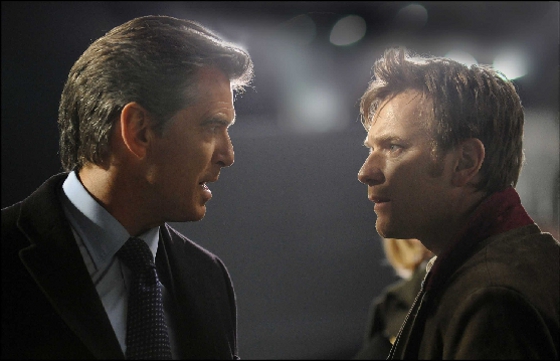The Ghost is a skilful political thriller examining the aftermath of the War on Terror which reflects the life and career of its director Roman Polanski.
Adapted by Robert Harris from his own novel, the story sees a journalist (Ewan McGregor) agree to ghost write the memoirs of a former British Prime Minister, Adam Lang (Pierce Brosnan), who bears a striking similarity to Tony Blair.
When the writer sets to work at the PM’s residence in Martha’s Vineyard, he finds out that his predecessor has mysteriously drowned and some other unnerving things.
Lang could be guilty of war crimes, specifically colluding with the US on torturing terrorist suspects, and after talking to his wife Ruth (Olivia Williams) and assistant Amelia (Kim Cattrall) he uncovers murky inconsistencies about the political leader’s background.
The first and most obvious aspect of The Ghost is the quality of the film making. Although it isn’t up there with his best work (Repulsion, Rosemary’s Baby, Chinatown and The Pianist) it is a highly absorbing and technically proficient thriller.
Its stately pace and considered approach are so old fashioned as to be positively revolutionary in these times, but it is a reminder that a veteran European director can still make a relevant and accessible film about contemporary issues.
I still have grave reservations about Ewan McGregor’s ability to do an accent but his overall performance is perhaps the best work he has done in quite some time.
Brosnan has much less screen time than I expected, but the easy charm, intelligence and thinly-veiled vanity he brings to the role is spot on. It might just be his best ever performance.
The real revelatory turn though is from Olivia Williams, who reminds us that this isn’t just a satire on the Blairs. Far from being a Cherie Blair clone, she is pitch perfect in an intriguing role, filling it with subtlety and nuance.
Given that the vast bulk of the film takes place at a house in America, the production design is first rate. The interiors were shot at studios in Berlin, with the island of Sylt in Nothern Germany ably doubling for a rainy Martha’s Vineyard.
Despite the technical expertise, including some nice widescreen cinematography from Pawel Edelman (who shot Polanski’s Oliver Twist and The Pianist), there is a distracting score by Alexandre Desplat, which – for the first half of the film at least – is filled with jaunty, vaguely comic rhythms and melodies that somewhat dilutes the sense of menace.
Some may expect this to be a broad satire on Blair’s enthusiasm for US foreign policy under the Bush Administration, but to the film’s credit it is more nuanced than that.
Indeed, the politics are not as cut and dried as they might initially seem. Although the climactic twist is something of a let down, there is a mournful tone to the film which captures both the disillusion with Blair and impotence citizens feel in the face of political leaders waging wars with no foreseeable end.
For some reason this film is called The Ghost in the UK and The Ghost Writer in other territories (although the print I saw it on said the latter), but the discrepancy is an interesting one as the title proves to be more than just a marketing after thought.
In a literal sense it describes the journalist (who is never named) but it could also refer to Lang, who is literally in a political afterlife and whose past actions continue to linger. But in an ironic twist – that no-one could have foreseen when it went into production – the real ghost of this film is Polanski himself.
Although it can be contentious to judge any work through a biographical lens, this film is a notable example of life and art colliding in an extraordinary way.
Whilst the film was in post production last September, the events of Polanski’s past caught up with him when he was arrested in Zurich and faced possible extradition to the US for having sex with a 13-year-old girl in 1977.
Although the controversy about that is yet to be resolved, all the way through The Ghost Writer I couldn’t shake the parallels between his life and what was on screen.
Like Lang, Polanski is forced into exile in a foreign country with the threat of prosecution; he has a murky past coming back to haunt him and he is also charming, skilled and flawed.
In the novel one could get the idea that the ghost writer is a version of Robert Harris, an initial supporter of Blair and a close friend of New Labour architect Peter Mandelson, who became disillusioned by the Iraq War.
But with the film adaptation, it struck me that the audience is invited to put themselves in the ghost writer’s shoes (there is probably a reason he is unnamed). Considering the parallels between Lang and Blair, the film actually becomes a fascinating insight into the career and life of Polanski.
In the the fascinating 2008 documentary Roman Polanski: Wanted and Desired, the LA prosecutor Roger Gunson commented on the recurring themes of the director’s work:
“Every Roman Polanski movie has the theme [of] corruption meeting innocence over water”
The infamous events of March 1977 could be interpreted in these terms: Polanski (corruption) met Samantha Geimer (innocence) over water (Jack Nicholson’s jacuzzi).
With The Ghost we again have corruption (political crimes and CIA intrigue), meeting innocence (a journalist discovering dark things) over water (drowning writers, political torture involving waterboarding).
Although ghosts are impossible in the literal sense, it is spooky the way Polanski’s life and career haunts what could be his last ever film.
> Official site
> The Ghost at the IMDb
> Reviews of The Ghost at Metacritic
> Posters of Polanski films that reflect some of his themes
